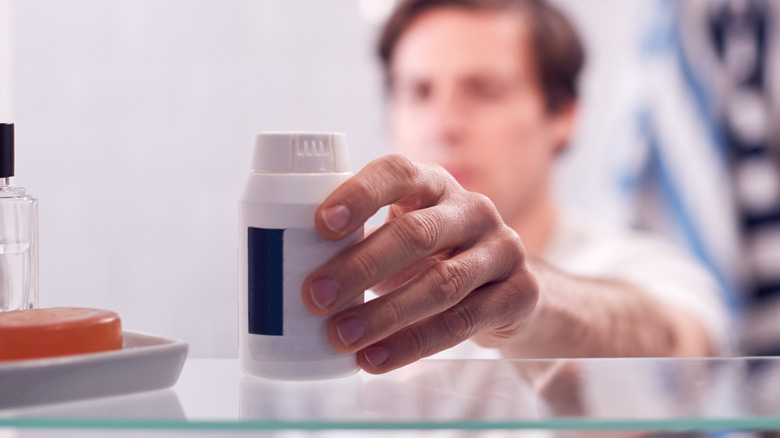Mistakes You're Making With Over-The-Counter Pain Relievers
Got a sore back or a nagging headache? No problem — there's a pill for that! Over-the-counter (OTC) pain relievers like Tylenol, Advil, Motrin, Aleve and plain ol' aspirin fill grocery and drugstore shelves everywhere, generate billions in profits for manufacturers, and are marketed to consumers like soda pop and candy. Yet as helpful as these brightly packaged, readily accessible drugs can be in relieving symptoms of common ailments, they are real drugs with potent ingredients. It can be easy for any of us as consumers to make mistakes.
A national survey of nearly 1,300 U.S. adults by the nonprofit U.S. Pain Foundation found that when choosing an OTC remedy for pain relief, most people make their selections based on how quick and effective they think the drug will be — and don't take into consideration their other medical conditions and medications they're already taking that could cause adverse effects.
"There's a lack of understanding because in general the medicines are safe," says Dr. Charles Melbern Wilcox, professor of medicine at the University of Alabama at Birmingham (via CBS News). "Many of us turn to these medicines without knowing the ingredients or their risks." So what are some of the most frequent mistakes we make with these readily accessible nonprescription drugs? We are so glad you asked!
Thinking all OTCs are the same
When you reach into your medicine cabinet (which is hopefully not in your bathroom — read on!), how picky are you about which pain reliever you choose? Do you go for the Tylenol (acetaminophen)? Or perhaps an Advil (ibuprofen)? All OTC pain relievers are not created equal. Each one works in a different way, and some may not work very well for your needs. Ask yourself what condition you are trying to treat, and don't lose sight of your underlying health conditions (if you have any). These are a few factors you need to consider before popping any pill. Ultimately, though, the best choice is going to be the medicine that's the safest for you.
For over-the-counter pain relief, there are nonsteroidal anti-inflammatory drugs or NSAIDs (such as aspirin, ibuprofen and naproxen) and analgesic non-aspirin remedies (like acetaminophen) which block your brain from releasing chemicals that cause you to feel pain. NSAIDs are favored for reducing pain and swelling for muscle soreness, arthritis or menstrual cramps, while acetaminophen is often the go-to for fever, headache pain, and sometimes arthritis, the Cleveland Clinic explains. However, each type of medication has its pros and cons, so consulting with your doctor or pharmacist first is always advisable. "Your provider's role is to guide and support you," says Dr. Matthew Goldman, a Cleveland Clinic family medicine specialist, "so don't hesitate to reach out to ensure you're making safe choices with OTC pain relievers."
Storing medications in a bathroom cabinet
Bathroom medicine cabinets have made a stylish comeback, but hopefully these days are just filled with shaving cream, Band-Aids, and toothpaste — and not actual medicine. Why? Because the hot and steamy environment of a bathroom couldn't be a worse place for storing your pills, say pharmacists (via ABC News).
That's why on most pill bottles and cartons, you'll see the instruction "Store in a cool, dry place." As the National Library of Medicine confirms, pills and capsules are damaged by heat and moisture. Any rooms with wildly fluctuating temperatures and moisture levels, like a bathroom, can make your medicines lose their strength and even go bad before the expiration date.
"The bathroom is not a good place to store medications because of the heat and moisture," says pharmacist Aaron Emmel, founder of Pharmacy Tech Scholar (via Best Life). "Warm and humid environments can speed up the breakdown process of medications, making them less potent."
Mixing pain relievers with alcohol
You might think you'd have to really exceed Tylenol, Motrin, or Aleve daily limits to cause liver damage, but you'd be wrong. They may seem like harmless OTC pills, but they are real drugs that can pack a powerful punch — especially when you've got alcohol in your system, too.
In fact, if you have one or more drinks on most days of the week or binge-drink (and yes, beer counts) and also take ibuprofen, naproxen, or aspirin regularly for chronic pain, you're really upping your risk for ulcers, stomach bleeding, and gastritis (inflammation of the stomach), or at least persistent ongoing digestion issues. Also, sorry to tell you, but Tylenol is not any safer with alcohol. Regularly mixing acetaminophen with booze can lead to serious and life-threatening liver damage, per GoodRX.
"People need to be aware that alcohol is a drug," says Dr. Anna Lembke, director of addiction medicine at Stanford University School of Medicine in Palo Alto, California (via SingleCare). "And using alcohol in combination with any other drugs, including OTC painkillers, can exacerbate side effects or lead to drug-drug interactions."
Reaching for NSAIDs when you're pregnant
There have been a lot of studies on NSAIDs and pregnancy, and the recommendation is they shouldn't be used unless ordered by your doctor, warns the Food & Drug Administration (FDA) – especially if you're 20 weeks or more along in your pregnancy. NSAIDS of any kind, including aspirin, ibuprofen or naproxen, may put the unborn baby at risk of kidney problems, resulting in low amniotic fluid levels (oligohydramnios) that may lead to miscarriage, birth defects, or complications during labor and birth (per Cedars-Sinai).
Other research has also shown that NSAIDs may increase risk of miscarriage really early in pregnancy. The risk was highest for women taking NSAIDs for at least two weeks, reports MedPage Today, or who took them around the time of conception and also had a body mass index of 25 or less (BMI). "[The study] compared newly pregnant women who took nonsteroidal anti-inflammatory drugs (NSAIDs) or acetaminophen, or neither, and found that using NSAIDs around conception carried a more than fourfold higher risk of early miscarriage."
Combining NSAIDs with prescription medication
It might seem like a no-brainer to not do this, but people combine prescription medicines with over-the-counter pain relievers all the time. Why? Because they simply don't know they shouldn't.
For example, research shows that antidepressants and NSAIDs don't mix (via Pharmacy Learning Network). Neither do NSAIDs with blood thinners (via GoodRX Health). Complications you could experience include kidney problems, bleeding in the gastrointestinal tract, or even life-threatening intracranial bleeding. But if you have headaches or muscle pain, chances are pretty high you might innocently combine a Motrin, Aleve, or aspirin with those prescription drugs and think nothing of it.
"If you are taking an NSAID while taking an anticoagulant, your risk of a major bleed is double what it would be if you weren't taking an NSAID," warns critical care medicine specialist Dr. Bruce Davidson (via MedicineNet). Major bleeds can occur just within eight days of taking an NSAID, he said. "It's not like you have to be taking them for weeks or months. Some bleeds happen with a single dose."
Choosing aspirin instead of other pain relievers for your kids
Aspirin used to be given routinely to children for fevers. It was even marketed to parents as an easy-to-administer orange-flavored chewable baby aspirin (via the Daily Pilot). It hasn't been recommended for children for 30-some years, though, because of the risk of Reye's Syndrome, a serious pediatric disease that causes swelling in the liver and brain (via Verywell Health). Unfortunately, not everybody has gotten that message.
In 1986, the FDA added the warning about Reye's Syndrome to all over-the-counter aspirin products, notes U.S. Pharmacist. The condition affects children and teenagers, and is thought to be set off by using aspirin for treating viral illnesses. However, the exact cause of the disease is still unknown and debated to this day.
"The risk is highest in children with a virus such as chickenpox or the flu, but it's serious enough that you should never give aspirin to a child without a doctor's order," says Dr. Arlene Roble, a University Hospitals pediatrician at UH Rainbow Lorain Pediatrics in Ohio.
Self-medicating instead of identifying the underlying problem
Over-the-counter pain relievers are meant to address temporary issues, not be part of a daily routine. When you're popping them all the time, whether for headaches or a persistent shoulder pain, the U.S. News & World Report warns you could be masking a much more serious condition.
Dr. Charles Vega, a clinical professor of health sciences at the University of California at Irvine, told Men's Health that if you need painkillers on a daily or weekly basis — whether for joint pain, headaches, or some other chronic issue — see your doctor to identify your underlying problem and the best solution to actually treat it.
"Instead of looking for a pill that works for every type of pain," says Alban Latremoliere, a pain physiologist at Boston Children's Hospital, "we need to be thinking about combination approaches that treat the underlying problems." For example, you may find that adding acupuncture or meditation to your lifestyle will be more effective and safer for chronic pain than solely relying on medication alone to get you through your day (via Time).
Taking NSAIDs when you have high blood pressure
In the United States, more than 100 million adults have high blood pressure (hypertension), currently defined as a reading of 130/80 mm Hg or higher, reports the Centers for Disease Control and Prevention (CDC). Yet many people with the condition are unwittingly worsening it by using OTC pain remedies that can push their blood pressure numbers even higher.
According to a 2021 survey by the American Heart Association, only 29% of U.S. adults think that nonprescription pain relievers can raise blood pressure. The most common of these problematic drugs are the NSAIDs ibuprofen (Advil, Motrin) and naproxen (Aleve). They're often mixed into the formulations of many cold and sinus products, too.
"People who have high blood pressure or are being treated with blood pressure medication — along with their loved ones and caretakers — need to be informed about safe over-the-counter pain relievers," advises Dr. Willie Lawrence Jr., a board-certified cardiologist. Better communication between doctor and patient will do a lot of good to avoid these missteps.
Paying for name brands instead of generics
Why do so many Americans spend money on name brands instead of buying generics? One CDC study focused in rural Alabama found that even in areas of high poverty and unemployment, a surprising number of people still opted for the higher-priced well-known brands instead of cheaper store-labeled drugs because they believed generics are inferior.
However, research shows that most healthcare workers — who should know a thing or two about medications — buy generics. This was revealed in a case study that analyzed shopping data from 100,000 households. It found that physicians, nurses, and pharmacists were far likelier than the average consumer to choose generic headache remedies. In fact, pharmacists purchased generic store brands nearly 90% of the time (via NPR).
Per the Food & Drug Administration (FDA), generics are equally as effective as name-brand medications. They must go through the same rigorous review process as their branded counterparts, contain the same active ingredients, the same dosage and strength, and same safety and effectiveness. One major exception is if you take a narrow therapeutic index drug such as anti-epileptics, blood thinners, lithium, and thyroid medications, reports GoodRX. In those instances, you should stick with the name brand unless your doctor gives the okay to go generic.
Assuming more pills means faster results
Many people assume that by doubling the dosage of a pain reliever, they'll double its effectiveness. But that's just not true, confirms Dr. Byron Cryer, a spokesperson for the American Gastroenterological Association. "There's the idea that generally more is better," he told Prevention, "but taking more than the recommended dose of OTC pain medicine doesn't result in faster relief."
Nearly one in five users of the OTC headache remedies ibuprofen, aspirin, and naproxen admitted they took more than the recommended maximum daily limit during a one-week study involving over 1,300 adults (via Pharmacoepidemiology & Drug Safety). In addition to not reading labels, many participants said they felt confident in choosing their own dose. In another example, this time of nearly 1,200 West Virginians, 85% of them answered most questions about OTC pain medications incorrectly, reports WVU Today.
"People think if they can buy something at the drug store it's safe and can't hurt them," Dr. Charles Wilcox, professor of medicine at the University of Alabama at Birmingham, told Today. "But it's not true that OTC equals safety."
Not recognizing overdose symptoms
It can be easy to inadvertently overdose on nonprescription painkillers, especially acetaminophen (Tylenol), because they're added to so many OTC cold and cough, arthritis, and allergy medications. The National Center for Health Research warns you'll find acetaminophen in the popular combination products NyQuil, DayQuil, Benadryl, Sudafed, Mucinex, and Theraflu, as well as their store-brand equivalents. Acetaminophen is also included in some prescription drugs as well, such as Percocet and Vicodin. Ibuprofen doesn't get a pass, either. It's also found in many multisymptom cold formulations.
Symptoms of an overdose of OTC painkillers may include nausea, vomiting, burning or pain in the stomach, fast eye movements, or yellowing of the eyes or skin, according to WebMD.
"These OTC treatments that promise to relieve sneezing, sore throat, headache, minor aches and pains, fever, runny nose, and more can lead to overdosage faster than you think," says Dr. Michelle Yagoda, facial plastic surgeon, ENT and voice care specialist (via The Healthy).
Taking NSAIDs when you're over 65
Bleeding in the stomach or digestive tract is the main issue with taking NSAIDS when you're an older adult. The drug can also raise blood pressure, a problem if you already have hypertension. "So you really want to leave [NSAIDs] as kind of your last choice, which is interesting, because most people go to these first. But when you're over 50, this one needs to start moving down the list, versus something like a Tylenol," says Ashley Garling, PharmD, a clinical assistant professor at the University of Texas at Austin's College of Pharmacy, via AARP.
Gastrointestinal bleeding is the main problem with NSAIDs, especially for senior citizens, warns UCSD Health, and "problems can develop without warning and at any time during treatment."
"In people over 60, the most common cause of gastritis, peptic ulcers and upper [gastrointestinal] bleeding is the use of NSAIDs," says Dr. Joel Weinstock, professor and chief of the division of gastroenterology and hepatology at Tufts New England Medical Center in Boston, per ABC News.
Thinking Tylenol is harmless
More than 600 products, both prescription and OTC, contain acetaminophen (Tylenol), ranging from Alka-Seltzer Plus to Excedrin. It's so prevalent in formulations that it's easy to overdo it, and the consequences of that can be rough.
"[Acetaminophen] is a leading cause of death from pharmaceuticals," warns Dr. Edward Boyer, chief of the division of medical toxicology at the University of Massachusetts, via ABC News. "The fact that it is an OTC medication suggests to the uninformed a lack of danger associated with its use."
Four grams of acetaminophen in 24 hours is the maximum dosage per day, per Harvard Health, but it's safest not to exceed 3,000 mg a day, especially if you take the drug often. And if you're drinking alcohol, the threshold is much lower because acetaminophen can severely damage the liver. "And so people might be taking Tylenol for their knee pain and then taking NyQuil for a cold, not realizing there's Tylenol in both of them," warns Amy Thompson, clinical associate professor at University of Michigan's College of Pharmacy. "They could easily be exceeding the daily dose without even realizing it," she told AARP.
Not talking to your pharmacist
Chances are you probably see your pharmacist more often than your doctor. Pharmacists are more than just pill counters. They are highly skilled healthcare professionals that are medication experts. They have in-depth knowledge of the biochemical makeup of drugs and how they interact with other drugs, says the Mayo Clinic. Your pharmacist can tell you all about the medications you've been prescribed, and also give advice on OTC medications and if they're safe to use with your other prescribed drugs. Your community pharmacist is a fantastic source of information!
"Pharmacists have more training and knowledge than physicians on how medications are made into pills, patches, etc. and how medications are absorbed and distributed in the body, metabolized, and excreted," says Sally Rafie, PharmD, pharmacist specialist at UC San Diego Health (via The Healthy).
Ideally, you should get all your prescriptions filled at one pharmacy, so there's one complete record of all your medications, advises WebMD. "The pharmacist will be more likely to pick up potential interactions among [the medications] and contact your doctor if needed. This applies to OTC as well as prescription drugs."















